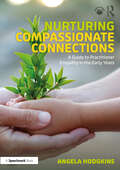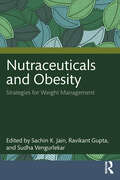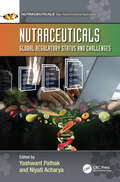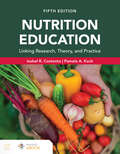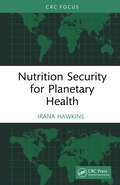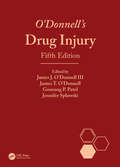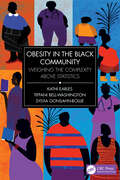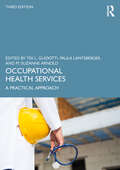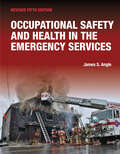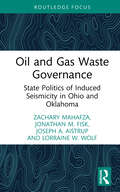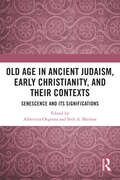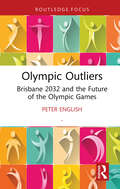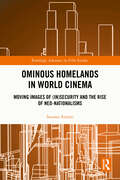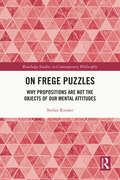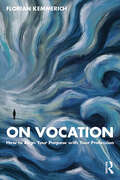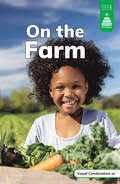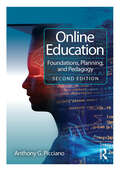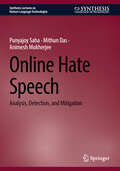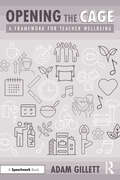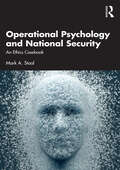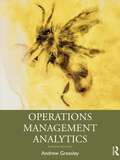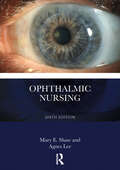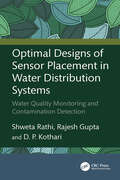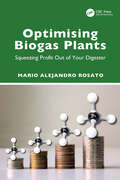- Table View
- List View
Nurturing Compassionate Connections: A Guide to Practitioner Empathy in the Early Years
by Angela HodgkinsIn a profession where empathy and compassion form the bedrock of impactful interactions, yet remain relatively unexplored, this book endeavours to be a beacon of inspiration and guidance.The book explores what compassionate relationships might look like and translates extensive research into actionable steps that practitioners can easily integrate into their routines. Chapters: Include guidance for fostering effective, empathetic relationships with colleagues and young children, as well as extending empathy to parents and carers Offer suggestions for supporting and promoting positive behaviour, with guidance on embracing empathy in challenging situations Prioritise practitioner wellbeing and include real-life case studies of nurturing connections, recognising both the demands and satisfaction of the profession Are full of reflective prompts and activities to reshape the narrative of early years practice and equip practitioners to navigate challenges with resilience. Nurturing Compassionate Connections advocates a strengths-based approach and aspires to redefine the landscape of compassionate practice, enriching the journey of those who care for young children. It is essential reading for all early years practitioners and allied professionals.
Nutraceuticals and Obesity: Strategies for Weight Management
by Ravikant Gupta Sudha Vengurlekar Sachin K. JainThis comprehensive volume explores the role that nutraceuticals can play in addressing obesity, shedding light on their potential as tools to promote sustainable weight management strategies as well as addressing associated health risks.Delving into the intricate interplay between nutrition, health, and obesity, the book provides a compelling account that illustrates how nutraceutical interventions can be incorporated into holistic obesity management strategies. It begins with an account of the mechanisms by which nutraceuticals function before featuring chapters on their efficacy and safety, how they can be integrated with other therapeutic interventions, and how they can be tailored for individuals with comorbidities. Offering a global perspective on the issue, there is also coverage of the various regulatory contexts in which nutraceuticals are sold and used.Insightful and practical, the book will interest both practitioners and students across allied health, pharmacy, and clinical medicine.
Nutraceuticals: Global Regulatory Status and Challenges (Nutraceuticals)
by Yashwant Pathak Niyati AcharyaThe global nutraceutical and health supplement market is experiencing unprecedented growth, driven by increasing consumer awareness and evolving healthcare needs. However, navigating the diverse and fragmented regulatory landscape across regions poses a significant challenge.Nutraceuticals: Global Regulatory Status and Challenges provides a comprehensive overview of global regulatory frameworks, empowering professionals to understand and comply with varying standards. From ingredient approval to labeling requirements, this book offers critical insights into key markets, as well as emerging markets.Features Detailed analyses of regulatory frameworks, terminology, and safety aspects. Expert perspectives on global trends and country-specific guidelines. Strategic insights for product development and market forecasting. Nutraceuticals: Global Regulatory Status and Challenges is an indispensable guide for regulatory professionals, R&D teams, marketers, and business leaders seeking to capitalize on the global nutraceutical market.
Nutrition Education: Linking Research, Theory, and Practice
by Isobel R. Contento Pamela A KochNutrition Education: Linking Research, Theory, and Practice, Fifth Edition is a practical and straightforward theory- and research-based guide for how to create, implement, and evaluate nutrition education that can change dietary behavior to improve the health of people and the planet. Built around the six-step DESIGN process for creating nutrition educational plans to be delivered to groups in person or indirectly through various physical and digital media along with plans for creating activities to provide environmental supports, this text also provides detailed nuts and bolts guidance to help students deliver these plans effectively through various media to a range of audiences or populations.
Nutrition Security for Planetary Health
by Irana HawkinsUsing the lens of nutrition security and equity for the living beings and living systems of the planet, Nutrition Security for Planetary Health takes an integrated, systems approach that not only delineates the antecedents of the multifaceted environmental crises—but offers solutions including the extensive co-benefits of whole plant foods nutrition as the foundational dietary pattern for improving planetary health. Overlooked yet inseparable problems that connect food systems to the transgression of our planetary boundaries, chronic disease, and zoonotic disease are discerned. Bolstering nature and biodiversity is emphasized throughout including regenerative agroecology, native plant foods and ecosystems, utilizing traditional and Indigenous wisdom, rewilding, and community science. Lastly, inspiring vignettes demonstrate the power of individual and collective actions that advance planetary health.
O'Donnell's Drug Injury
by James T. O'Donnell Gourang P. Patel Jennifer Splawski James J. O'Donnell IIIO’Donnell’s Drug Injury, Fifth Edition presents up-to-date information on adverse events caused by drugs via direct pharmacological action or indirectly through injury caused by impairment or an altered mental state. The impact of drug injury on legal cases is emphasized throughout the book. This book serves as a comprehensive reference for attorneys, pharmacists, physicians, risk managers, nurses, drug manufacturers, and regulators—as well as anyone with an interest in drug use and drug injury. It lays out general pharmacological principles, presents an in-depth discussion of high-risk drugs often implicated in drug injury, details best practices to improve medication safety in clinical pharmacy practice, and discusses a variety of important forensic toxicology concepts such as drug testing.Key areas covered include: Pharmacology and toxicology of high-alert and high-risk drugs often implicated in legal cases Application of pharmacological and toxicological principles to the law Coverage of processes to ensure medication safety, gaps and blind spots in this process, and recommendations on how to enhance drug safety Eight new chapters covering timely topics such as Antineoplastics Therapy, Contrast Media Neurotoxicity, Drug Recognition Evaluation, RxISK Adverse Drug Reaction Reporting Program, Compounding Pharmacy Fraud, Involuntary Intoxication, and Total Parenteral Nutrition Errors and Injuries Contributions by 43 authors with diverse expertise, including pharmacologists; toxicologists; clinical pharmacists; physicians; attorneys; nephrologists, and a neurologist, hepatologist, epidemiologist, addiction expert, and an investigative health reporter.
Obesity in the Black Community: Weighing the Complexity above Statistics
by Kathi Earles Tiffani Bell-Washington Sylvia Gonsahn-BollieThis landmark textbook, written by three leading experts in obesity medicine, provides a comprehensive examination of the complexities, challenges, and opportunities in addressing obesity within Black communities. By exploring the interplay of biopsychosocial factors and cultural dynamics, this authoritative resource presents a forward-thinking, evidence-led approach to one of the most critical public health issues of our time.Grounded in the latest research and enriched by clinical expertise, the book offers actionable strategies for healthcare professionals seeking to deliver culturally sensitive and effective care. With a focus on addressing health disparities and dismantling harmful stereotypes, this text sets a new benchmark for equitable and impactful obesity treatment.Key Features Challenges misconceptions and biases to offer practical, solutions-driven approaches to obesity care Combines clinical best practices with cultural competence to enhance patient engagement and outcomes Features contributions from Black physicians, providing valuable insights that blend lived experience with professional expertise Ideal for medical students, clinicians, and healthcare professionals, this essential guide is also a vital resource for researchers and public health advocates dedicated to advancing health equity and improving outcomes for historically underserved populations.
Occupational Health Services: A Practical Approach
by Tee L. Guidotti M. Suzanne Arnold Paula LantsbergerThe new edition of Occupational Health Services provides an essential guide in setting up, running, and improving healthcare services either in an organization or within the community. The book offers an invaluable toolkit for the prevention, diagnosis, treatment, and occupational management of work-related health issues.The text covers: An overview of occupational health care in the United States and Canada – how it is organized, who pays for what, how it is regulated, and how workers’ compensation works. It explains how occupational health services are managed in practice, whether within a company, as a global network, in a hospital or medical group practice, as a free-standing clinic, or following other models. The management of core services, including record-keeping, marketing, service delivery options, staff recruitment and evaluation, and program evaluation. It provides details on specific services such as clinical service delivery for injured workers, periodic health surveillance, impairment assessment, fitness for duty, alcohol and drug testing, employee assistance, mental health, health promotion, emergency management, global health management, and medicolegal services. Thoroughly updated throughout and including a new chapter on Consulting, this unique book will be a key reference work for managers and health practitioners from a range of backgrounds, including but not limited to medicine, nursing, health services administration, and physical therapy, as well as students training in these fields.
Occupational Safety & Health in Emergency Services 5E Revised: .
by James S. AngleDesigned for use within courses based on the Fire and Emergency Services Higher Education (FESHE) Occupational Safety and Health for Emergency Services model curriculum, Occupational Safety and Health in the Emergency Services, Revised Fifth Edition provides a comprehensive overview of the many components of occupational safety and health for the emergency services. This updated resource provides a historical look at industrial safety and health and describes how providing a safer emergency services work environment reduces first responder deaths and injuries. It also meets the intent of NFPA 1550, Standard for Emergency Responder Health and Safety, 2024 Edition, which includes Chapter 4: Health and Safety Officer (NFPA 1521).The Revised Fifth Edition describes the qualifications and responsibilities of the Health and Safety Officer, which include monitoring safety conditions, identifying hazards, and acting to lower risks during emergencies.Occupational Safety and Health in the Emergency Services, Revised Fifth Edition, which focuses on firefighter health and safety, describes how to stay safe and healthy in a high-risk environment and includes the following:Thorough coverage of the 16 Firefighter Life Safety Initiatives with emphasis on their positive impact when implementedCase studies, review and discussion questions, and additional resources for each chapterDiscussion of NFPA standards related to safety and health, including active shooter/hostile event response (ASHER), reducing exposure to fireground toxic contaminants and decontamination procedures, and atypical stress events for first respondersDiscussion of the Public Safety Officers' Benefits (PSOB) programFind everything you need for a full course of study in the print and digital package: a printed textbook, eBook, assessments, analytics, slides, and flashcards. © 2026 | 288 pages
Octavio
by Dustin Resch"Curious Octavio is not your average young octopus. Instead of staying hidden in his coral reef, his nosiness gets the better of him, and he pops out to observe the divers who are observing him! Told in hilarious mockumentary style, this is the tale of Octavio and his octopus “superpowers”—including his talent for getting out of tight situations! Scuba diver and debut author illustrator Dustin Resch shares the true story of a little octopus who hitched a ride on a diver’s tank and went on an unexpected adventure."
Oil and Gas Waste Governance: State Politics of Induced Seismicity in Ohio and Oklahoma (Routledge Research in Public Administration and Public Policy)
by Jonathan Fisk Zachary Mahafza Joseph A. Aistrup Lorraine W. WolfIn Oil and Gas Waste Governance, Zachary Mahafza, Joseph A. Aistrup, Jonathan M. Fisk, and Lorraine W. Wolf tell the story of unconventional oil and gas production, earthquakes, and how they both relate to the much broader conversation centering on private property, energy production, and the role of science within the public policy process, and environmental sustainability.Utilizing a unique national-level dataset that includes human-induced earthquakes associated with oil and gas development between 2006 and 2018, the book combines insights on focusing/tipping events, media, geoscience, and state-choice to develop and test a new model of event-driven policy change. Examining the politics of induced seismicity at the national level as well as in Ohio and Oklahoma, the authors demonstrate how event severity and frequency interact with political and social considerations and, in turn, contribute to administrative decision-making. Oil and Gas Waste Governance offers a much-needed examination of seismicity in Public Administration and Public Policy.
Old Age in Ancient Judaism, Early Christianity, and Their Contexts: Senescence and Its Significations
by Albertina Oegema and Seth A. BledsoeThe collection of chapters in this volume explores the significance of old age for Jews and Christians as well as Greeks and Romans in antiquity.By examining a diverse range of sources, the authors in this volume elaborate on the manifold ways that old age functioned as a social discourse in ancient Jewish, Christian, Greek, and Roman contexts. The discussions herein demonstrate how perceptions of old age were closely intertwined with notions of authority and wisdom, gender and social dynamics, social and familial anxieties, and the body and disability. They show that conceptualizations of old age are far more prevalent and significant to ancient social and political structures, rhetorical discourse, and religious imagination than one might expect. By including studies on old age in different religious and cultural contexts, the volume highlights the commonalities, as well as the many differences, that existed among various communities in antiquity.This volume is of interest for students and scholars of religion, particularly for those working on Jews, Christians, Greeks, and Romans in the ancient Mediterranean, as well as scholars in classical studies and ancient history. It is also a valuable resource for gerontologists who wish to explore the historical background of present-day notions of old age.
Olympic Outliers: Brisbane 2032 and the Future of the Olympic Games (Routledge Focus on Sport, Culture and Society)
by Peter EnglishThis book examines the significance of the Brisbane Olympics and Paralympics, taking place in 2032, in the context of the history and future of the Olympic Movement.As an outlier host, Brisbane is an experiment towards a new Olympic and Paralympic future. In an era of rising costs, the Brisbane Games represent a significant shift away from megacities towards a more sustainable future for the Olympics. Drawing on research including media analysis, published interviews and official documents, and considering host cities and nations, legacies, athletes and Olympic history, this book examines the viability of Olympic outliers and asks whether they might develop into the Olympic mainstream.This is an important read for anybody with an interest in the Olympics, sport history, sport media, sport governance and policy, or events.
Ominous Homelands in World Cinema: Moving Images of (In)Security and the Rise of Neo-Nationalisms (Routledge Advances in Film Studies)
by Susana AraújoOminous Homelands in World Cinema examines contemporary films from a range of national settings that expose and critically engage with representations of “Homeland” – a term that resurfaced with renewed intensity in the United States through the establishment of the Department of Homeland Security after 9/11 and gained traction across Europe, contributing to the formation of new securitarian configurations whose impact has resonated globally.By drawing on contemporary films from different national contexts, and relating these with emerging political discourses, this book explores some of the new meanings and images associated with ideas of home and land. The analysis also traces how notions and representations of “Homeland” in popular culture have increasingly become infused with themes of security and control, not only linked to terrorism but also progressively connected to a number of other global processes such as the so-called “refugee crisis,” the emergence of new geopolitical powers, wars and the rise of authoritarian leaders and nationalistic movements in different parts of the world.This book will be of interest to students and scholars in media and film studies, American studies, cultural studies, critical security studies, international relations, contemporary history and global studies.
On Frege Puzzles: Why Propositions Are Not the Objects of Our Mental Attitudes (Routledge Studies in Contemporary Philosophy)
by Stefan RinnerThis book argues against the received view of propositional theory, according to which mental attitudes—such as believing, knowing, hoping, and wishing—are relations held between agents and propositions.Roughly speaking, propositions are primary bearers of truth that are neither sentences nor utterances of sentences, be it of a public language or of a language of thought. This book argues that the propositional theory does not provide a solution to Frege’s puzzle about belief, which arises if we formulate disquotational principles connecting sincere assertion and belief, certain standards regarding rationality, and semantic principles such as the theory of direct reference within the framework of the propositional theory. This suggests that we must reject the propositional theory. The book emphasises this again by showing that the propositional theory cannot solve Schiffer's puzzle regarding de re belief, which, in addition to disquotational principles connecting sincere assertion and belief, uses highly plausible exportation and rationality principles for de re belief. It then discusses possible alternatives to the propositional theory, such as Marcus’ theory of states of affairs, Lewis’ property account, Larson and Ludlow’s theory of interpreted logical forms, and Moltmann’s Multiple Relation Theory. Just like the propositional theory, these theories maintain that mental attitudes such as believing are relations, and they also inherit the main problems of the propositional theory. Therefore, the author proposes and develops a non-relational account of the attitudes in question that together with a measurement account of the respective attitude ascriptions, provides a solution to both Frege’s puzzle and Schiffer’s puzzle.On Frege Puzzles will appeal to scholars and graduate students working in philosophy of language, philosophy of mind, and logic.
On Vocation: How to Align Your Purpose with Your Profession
by Florian KemmerichOn Vocation: How to Align Your Purpose with Your Profession explores the transformative journey of aligning one’s passion and purpose with one's profession to create meaningful impact.Instead of a career guide, this book is more of a blueprint for aligning personal values with professional endeavours in a way that fosters resilience, innovation, and systemic impact. Many professionals feel disconnected from their work, grappling with dissatisfaction, burnout, and a lack of purpose. Traditional career advice often fails to address the deeper alignment between an individual's values and their professional contributions. This book fills that gap by providing a structured, actionable process to help readers transform their careers into vocations that bring both personal fulfilment and systemic impact. In this highly practical book, Florian Kemmerich introduces the concept of “vocating,” a structured seven-step process that helps readers discover their true calling, align it with global challenges, and build a sustainable vocation that contributes to both personal fulfilment and societal good. On Vocation offers readers actionable tools, reflective exercises, and inspiring narratives to help them navigate their own path toward a purpose-driven vocation.Readers learn not only how to discover their purpose but also how to implement it within their professional lives in a way that benefits both themselves and the world.
On the Farm
by Laura StickneyFarms are places where people raise plants and animals. Farmers work hard to harvest crops from their fields. They take care of animals like cows, horses, and pigs. Beginning readers hone their phonics skills while learning about different types of farm animals and plants. As readers practice decoding words with the r-controlled vowel a, they gain nonfiction knowledge. Every Stairway Decodables book combines multiple aspects of the Science of Reading to support small group instruction, independent reading, and reading practice at home.
Online Education: Foundations, Planning, and Pedagogy
by Anthony G. PiccianoOnline Education is a comprehensive exploration of fully online and blended teaching platforms, addressing history, theory, research, planning, and practice. As colleges, universities, and schools around the world accelerate their adoption of large-scale technologies and traditional class models shift into seamless, digitally interactive environments, critical insights are needed into the implications for administration and pedagogy. Written by a major contributor to the field, this book contextualizes online education in the past and present before analyzing its fundamental changes to instruction, program integration, social interaction, content construction, networked media, policy, and more. This substantively revised second edition examines recent developments in services and implementation, from the expansion of synchronous online learning experiences to the widened availability of generative artificial intelligence software, while updating its research foundations and case studies. A provocative concluding chapter speculates on the future of education as the sector becomes increasingly dependent on advanced AI systems, massive cloud computing, biosensing tools, and robotics.
Online Hate Speech: Analysis, Detection, and Mitigation (Synthesis Lectures on Human Language Technologies)
by Animesh Mukherjee Punyajoy Saha Mithun DasThis book informs readers on how to understand, detect, and mitigate hate speech in online social media. The authors first cover the definition of hate speech and how its prevalence can be measured on online social media platforms using text and graph-based methods. The book then describes the process of detecting hate speech and presents a comprehensive account of the AI models that are currently being used. Further, the authors discuss the associated challenges that must be overcome while using these models. The book concludes with an overview of the mitigation techniques for hate speech, including blocking or suspension of the accounts (hard technique) and counterspeech (soft technique), and a discussion of the effects of these techniques on social media platforms.
Opening the CAGE: A Framework for Teacher Wellbeing
by Adam GillettOpening the CAGE invites you to embark on a transformative journey within the world of education, unveiling a powerful framework to nurture the wellbeing of staff that will not only retain valuable educators but create positive learning environments, ensure academic success and address student needs.The CAGE framework – representing Communication, Appreciation, Growth and Development, and Empathy and Support – offers a fresh, holistic perspective on addressing the often-overlooked needs of teachers, encapsulating the key components of wellbeing. Through compelling real-world examples, research-based insights and practical strategies, the book explores the profound impact of teacher wellbeing on the quality of education, before drawing inspiration from best practices in different sectors – from sport to business – to provide a roadmap for creating a more positive and productive educational environment.Whether you are a member of staff in a school seeking to reignite your passion for teaching, a school leader aiming to enhance staff morale or a policymaker dedicated to improving educational outcomes, this book empowers you with the tools to prioritise and foster teacher wellbeing.
Operational Psychology and National Security: An Ethics Casebook
by Mark A. StaalThis book offers a comprehensive guide to ethical decision-making for practitioners of operational psychology working in national security and defense.The terrorist attacks of 9/11 led to the mass recruitment, training, and employment of psychologists to support national security, national defense, and public safety initiatives. The result was a confluence of advances in the field, alongside highly controversial missteps and calls for greater guidance. This book aims to improve practitioners’ ability to recognize ethical dilemmas before they arise, assess the risks they present, and respond to them in a manner characterized by thoughtful engagement and virtuous behavior. The work adopts an integrated approach, providing a holistic treatment of ethics and ethical decision-making. It begins with the establishment of a broad theoretical foundation of moral reasoning and ends with presentations of relevant rule-based codes, illustrative case studies, real-world contemporary issues, and practical solutions to common ethical problems. The book is unique in its comprehensive ethics case analysis of operational psychology, and ethical dilemmas are presented both by issue and by practitioner core competencies. As such, it enables readers to easily cross-reference ethical dilemmas by the nature of the dilemma and by its context (where it is most likely to occur).This book will be essential reading for psychologists working in national security, national defense, and public safety sectors and of much interest to students of ethics and ethical decision-making.
Operations Management Analytics
by Andrew GreasleyOperations Management Analytics, 4th Edition, provides a clear and accessible introduction to this important area of study. Taking an international approach, and written in a concise style, this revised new edition has been updated throughout to ensure that all key areas of operations in both the manufacturing and service industries are accounted for.New to this edition, the reader will find coverage of Industry 4.0, supply chain disruption, Internet of Things (IoT), 3D printing, Big Data Analytics, AI and digitalisation. Environmental and sustainability issues are emphasised, as are globalisation and automation processes. Aimed in particular at students seeking an introduction to the subject, Operations Management Analytics provides the reader with a comprehensive resource upon which to base their learning. A number of new case studies are featured – these are drawn from the service industry, manufacturing and the public sector – and come from a range of international contexts. Each chapter is complemented by a strategy link section that relates the chapter topic to operations strategy and an analytics section that provides quantitative content and exercises. End-of-chapter questions and exercises encourage the reader to reflect on what they have learnt.Operations Management Analytics, 4th Edition, is the ideal textbook for undergraduate students seeking to quickly get to grips with this fascinating and lively subject.
Ophthalmic Nursing
by Agnes Lee Mary E. ShawOphthalmic Nursing provides an overview for those setting out in a role within ophthalmic nursing. It includes essential anatomy and physiology – the foundations for understanding how the eye functions and why and how problems occur – and relates them to the care and needs of the patient.This clearly presented text draws on the most up-to-date evidence-based guidelines, and the inclusion of colour images, reflective questions, and exercises allows readers to apply their knowledge to the realities of the care setting. Beginning with chapters on practising as a nurse and the ophthalmic patient, the book goes on to outline the basics of an eye examination before introducing eye health and ill health in different parts of the eye and covering issues such as glaucoma and trauma and explore the role of artificial intelligence (AI). In the management of patients with glaucoma, the book also discusses the impact of COVID-19 on eye health and the impact of lockdown on patients who are visually impaired. It ends with a chapter focusing on ophthalmic drugs and includes two entirely new chapters on multi-professional ophthalmic-led clinics and vision rehabilitation. A new section in Appendix 4 sets out the competency assessment tools for the various expanded role.A valuable resource for nurses and healthcare professionals in practice and training, this book continues to be the ‘go-to’ source for those caring for the ophthalmic patient.
Optimal Designs of Sensor Placement in Water Distribution Systems: Water Quality Monitoring and Contamination Detection
by Rajesh Gupta D. P. Kothari Shweta RathiThe dual purpose of regular monitoring and contaminant event detection in the water distribution systems (WDSs) can be achieved through sensors that can monitor general water quality constituents, such as pH, residual chlorine, conductivity, temperature, etc. This book details different sensor placement parameters considered for contamination detection and regular/routine water quality monitoring in WDSs and their evaluations. It covers genetic algorithm (GA)-based methodology, selecting a specified number of optimal sensor locations using combined weighted objectives. Applications to different pressure-deficient systems and intermittent systems are explained as part of a case study in India.Features: Reviews existing methodologies on the solutions to water contamination and sensor placements in the water distribution systems (WDSs). Discusses regular water quality monitoring techniques including the methodology and guidelines of water quality monitoring techniques. Includes applications on the methodologies under different cases, such as PDA, considering risk-based sensor placement. Provides illustrative examples with the proposed alternative algorithm both for single- and multi-source networks. Examines applications of the proposed GA-based optimal sensor location modeled to a real-life scenario. This book is aimed at graduate students and researchers in civil engineering, civil and environmental engineering, environmental engineering, hydraulic engineering, water supply/resources engineering, and hydro-informatics.
Optimising Biogas Plants: Squeezing Profit Out of Your Digester
by Mario Alejandro RosatoKeeping theory to a minimum without sacrificing scientific rigour, this comprehensive guide offers readers a practical approach to boosting the profitability of their biogas plants. The techniques explained allow for an assessment of a biogas plant throughout its entire life cycle, from critical review of the business plan to the selection of retrofits to recover additional income from the process by-products. This book: Details how to apply the scientific method to the review of biogas projects, considering technical flaws induced by marketing and human factors like cognitive bias Explains a method for the quick startup of digesters Proposes a thermodynamic approach to the selection of biogas upgrading solutions, making the choice independent of marketing claims or biased information Provides a summary of possible marginal incomes from biogenic CO2, residual heat, and digestate Includes the latest technological developments in laboratory measurement instruments and techniques beyond the mere biochemical methane potential (BMP) test Includes a guideline to perform a technical due diligence, with examples of the most frequent errors in biogas plant business plans Building upon the laboratory test techniques published in the author’s complementary book, Managing Biogas Plants, this text helps readers who are investing in or managing existing industrial biomass plants to optimize processes and profit.
